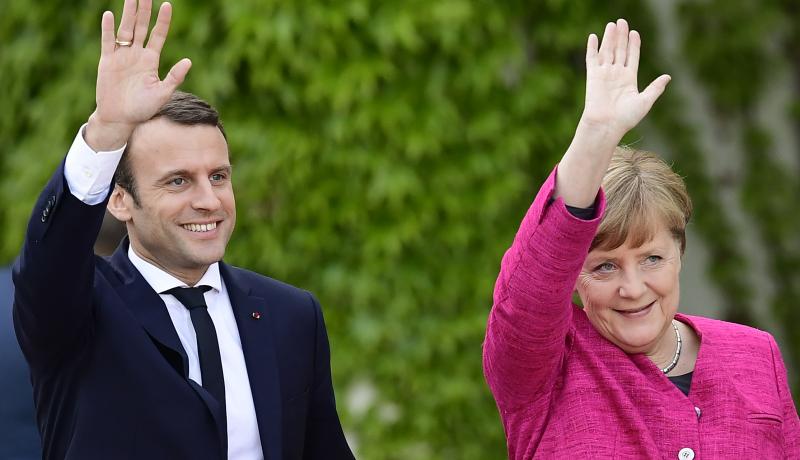
When Donald Trump took the oath of office in January, Europe looked deeply troubled: riven with political extremism, struggling to boost economic growth and plagued by existential doubts about its future. As President Trump lands for his first official European visit this week, the old continent seems positively vigorous.
With Angela Merkel polling high as the next election approaches and Emmanuel Macron settling into the Élysée, Europe’s centre of power now looks in steady, predictable hands. Refugee flows are down and rarely have European leaders been more unified than when they endorsed negotiating terms for Britain’s exit.
With the new US administration at the very least distracted from its desire to remake the transatlantic relationship and an economic recovery that just may endure, a rare window has appeared for European leaders to concentrate on important reforms. Naturally, they cannot solve all the continent’s problems, but they do have a window to make important incremental progress. Financial markets will be watching closely for signs that the current confidence is warranted.
At their meetings this week, European leaders will be keen to glean any hints on the president’s intentions on taxes and trade. They will also assess differences on Russia and Syria, but they may be more preoccupied with what they can accomplish themselves in this fresh moment of self-assurance.
European Union data shows improving economic sentiment, reflation and growth now clocking at 2 per cent. Unemployment is still high, but seems poised to drop below pre-crisis levels. And investors have responded, driving the Euro Stoxx index up more than 8 per cent this year—that’s 2 per cent ahead of the S&P 500.
So this is a moment for European leaders to take advantage of some breathing space for a few quick wins. There is no immediate need for dramatic new schemes for a continental finance minister or treaty revisions to pool sovereign debt. Even if populist parties have suffered recent setbacks, voters are hardly in the mood a lot more Europe right now. But there are five areas of achievable, incremental progress this summer that can set Europe’s course towards progress and growth:
- France has below average growth and above average unemployment, but now also enjoys a new government committed to boosting labour market flexibility and cutting government spending. French reforms will not deliver quick results, but the broader European recovery should offer Team Macron a little breathing room. Progress on these over the next few months will earn the political capital he will need to withstand German pressure to cut France’s deficit too quickly.
- Italy’s growth lags France and its debt is higher than all euro economies except Greece. The real priority in Rome, however, must be to clean up Italian banks, where non-performing loans are running three times the EU average. The choices are painful and the political pressures are enormous ,amid rising anti-European sentiment. Still, a decision to approve the recapitalization of troubled Monte dei Pasci di Sienna is long overdue and will set an important precedent for cleaning up other troubled banks that drag the down entire economy.
- The clock is already ticking on Brexit negotiations and the EU’s remaining 27 members want to ensure that there are substantive costs associated with Britain’s departure. These will likely be assessed in new rules that restrict the City of London’s financial services in the EU, which continental Europeans have been longing to impose in any case. The final deal will not take shape before the German elections, but the initial talks begin in June and will set the tone for the difficult compromises that both sides will have to make. It remains in no one’s interest for them to end without a clear path forward.
- A tight German election would put even more pressure than ever on European Central Bank President Mario Draghi to normalize monetary policy faster. As the good economic news continues to come in, there will still be calls for him to end his market purchase program sooner, but he will also need some support to allow him to moderate the pace of tapering.
- A Greek programme must be concluded to meet a July repayment deadline, but negotiators are struggling to cross the finish line. Greece remains small and economically isolated, but all of Europe would benefit from finally putting it on a realistic path and that includes meaningful debt reduction. A government in Athens that is committed to reforms may be even more important right now, but reforms will be easier when relief is in sight.
Capital flows have underscored fresh confidence in the Europe’s moment, but they will reverse direction at the first sign of trouble. Like any company that must court investment, European leaders need to demonstrate that they can deliver on their strategy. Judgements will be swift if they cannot take advantage of this rare moment.
Christopher Smart is a senior fellow at the Harvard Kennedy School's Mossavar-Rahmani Center for Business and Government. He is joining us after six years in the Obama administration as a senior policymaker for international economic affairs. As special assistant to the president at the National Economic Council and the National Security Council, he was principal advisor on trade, investment and a wide range of global economic issues.
